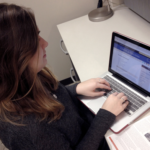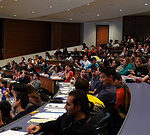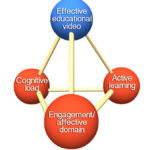Author
Flipping the Traditional Mentoring Model
Apr. 24, 2017—by Rachel Biel, CFT Undergraduate Intern This past summer I had the opportunity to intern for Spectrum Health—a healthcare system in my hometown, Grand Rapids, MI. For the summer I was assigned to work with Senior Project Manager Rebecca Content, whose project was joint venture with another local hospital to provide primary care and specialty...
Encouraging Engagement and Enthusiasm– One student’s perspective on online course design
Mar. 1, 2017—By Rachel Biel, Undergraduate Intern My first interaction with the online classroom came in the fall of 2012, my senior year of high school. With my sights set on attending Vanderbilt, I enrolled in four AP courses, each of which my school only taught one section. This left my daily schedule completely inflexible: I had...
Claiming Your Authority in the Classroom
Sep. 28, 2016—by Cynthia Brame, CFT Assistant Director One of the most persistent questions about college teaching is how to establish authority while being student-centered and giving your students voice. It ranks right up there with—and is related to—questions about how to engage students. For a scholarly perspective, we can turn to a model proposed by Paul...
What makes group work work?
Sep. 2, 2015—by Cynthia Brame, CFT Assistant Director We’ve all been there: victims of unproductive and frustrating group work. Perhaps an instructor poses a question, tells us to turn to our neighbor and discuss it, and we all sit silently…because the answer’s obvious and there’s nothing to discuss. Or perhaps we have an end-of-semester project to develop,...
Making the most out of educational videos
Aug. 31, 2015—by Cynthia J. Brame, CFT Assistant Director Faculty Focus recently released the results of a survey on the flipped classroom, reporting that approximately three quarters of the >1000 respondents had tried flipping the classroom—and that most of them (>60%) found the experience positive for themselves and their students. While about three-fourths of the respondents found...
Three things I learned while writing about test-enhanced learning
Aug. 24, 2015—By Rachel Biel, CFT undergraduate intern I recently had the privilege of coauthoring an essay about the benefits of testing beyond assessment. As a student who is tested most commonly for formal assessment, the idea of testing as part of the learning process was new to me. Beyond the practical implications of incorporating more testing...
Learning about the basics of learning
Aug. 17, 2015—By Cynthia Brame, Ph.D., CFT Assistant Director Last September, I read an article in the New York Times Magazine suggesting that pre-testing could improve subsequent student learning. The article was based on work by Elizabeth Ligon Bjork and colleagues, and indicated that pre-testing could help students avoid the “fluency fallacy” and might alert them to...
Peer review of teaching with a helping hand from the CFT
Aug. 11, 2015—by Cynthia Brame, Assistant Director Peer review is a cornerstone of the way that academics build new knowledge, helping to ensure high quality research that moves fields forward. Peer review of teaching can be a valuable tool for much the same reasons it is valuable for research. It can help departments and individuals reflect on...
How do you teach novice scientists to be thoughtful, critical researchers?
Apr. 10, 2014—By Cynthia Brame I recently had two experiences that spoke to this issue. First, I ran into my colleague Carl Johnson in the BioSci department at Vanderbilt. He said that he was finishing up getting ready to present at journal club, and that he needed to go take another look at the paper “to...
The Power of Design: What design projects can teach our students—and us
Feb. 13, 2014—By Cynthia J. Brame, Assistant Director This year, the CFT has adopted a “Students as Producers” theme, exploring ways that instructors can scaffold their classes to help students do meaningful, creative work. Design projects, the linchpin of any engineering curriculum, illustrate some of the key benefits and lessons of helping your students be producers. I’ve...










